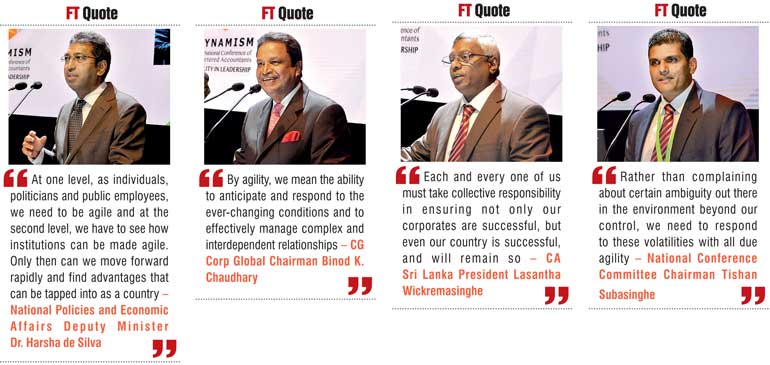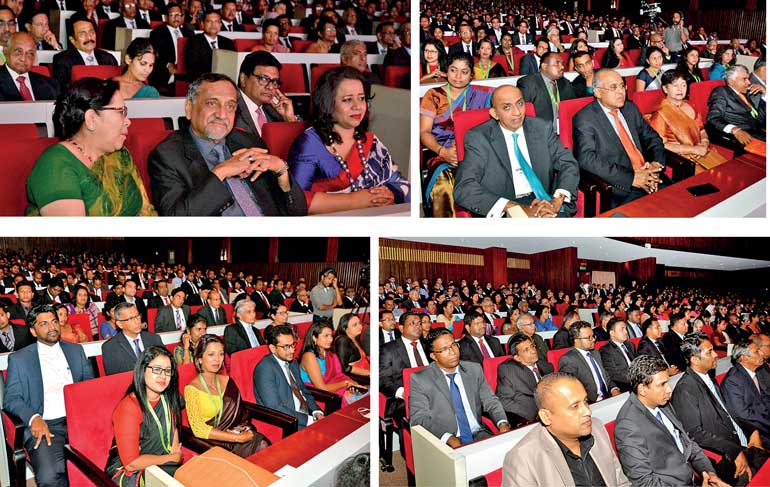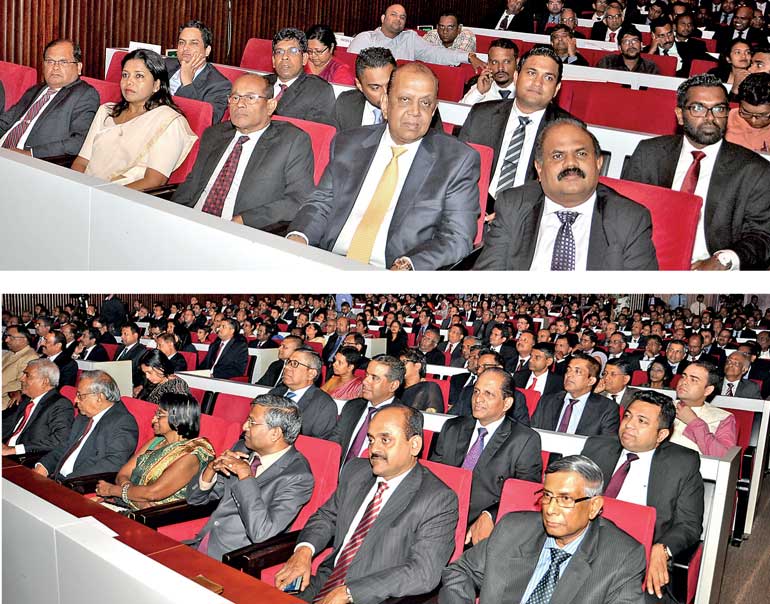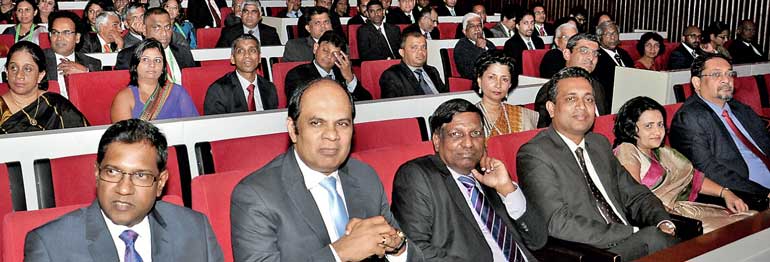Sunday Feb 22, 2026
Sunday Feb 22, 2026
Thursday, 26 October 2017 00:00 - - {{hitsCtrl.values.hits}}

By Uditha Jayasinghe
In a disruptive world constantly challenged by innovation, agile leadership is essential to thrive, Nepal’s only billionaire and CG Corp Global Chairman Binod K. Chaudhary said yesterday, calling on leaders to not just adapt to change but to be the change.
Delivering the keynote address at the inauguration of what has been announced as Sri Lanka’s largest business summit, the National Conference of Chartered Accountants, in the presence of the country’s corporate glitterati, he was upbeat on the opportunities disruption provides for business.
The annual conference is organised by the Institute of Chartered Accountants of Sri Lanka (CA Sri Lanka).
This year too the conference received an overwhelming response, with over 1,800 delegates registering for the flagship event at the BMICH, setting an all-time new record of the annual event. The three-day conference which will revolve around ‘Dynamism: Agility in Leadership’ will conclude on 27 October after two days of technical sessions featuring local and international speakers.
For Chaudhary, the theme of the conference has special significance. Initially planning to become an accountant, life took him down the road of entrepreneurship, eventually resulting in him taking his grandfather’s businesses and converting it into a global empire spanning over 100 companies.
“The business world today loves to use the term ‘agility’. What does it mean for a business to be agile? To me, it means to continuously assess the mood of your customers and adapt quickly to their changing needs. By agility, we mean the ability to anticipate and respond to the ever-changing conditions and to effectively manage complex and interdependent relationships,” he said.
Business agility refers to distinct qualities that allow organisations to respond rapidly to changes in the internal and external environment without losing their momentum or vision. Adaptability, flexibility and balance are three qualities essential to long-term business agility, he said.

Looking for strengths inside the box
“Because of mounting complexity and a relentless and accelerating pace of change in the global economy, it has become clear that all business organisations as well as government agencies and non-profits – and the teams within them – need to develop higher levels of agility. Today, agility not only concerns the general attitude of the organisations, but also the tools they use, such as their online marketing and social engagement tools.”
“We don’t always think outside the box, we also look for our strengths inside the box. We need creative thinkers with a deep sense of purpose. We need to be able to examine situations from multiple perspectives and to connect the dots between seemingly-disparate issues. Such an approach allows us to generate the much-needed novel strategic insights. As a result, our visions for the future become innovative, purposeful, and compelling. Then there is no stopping.”
The need for any forward-looking agile company is to not only react to these disruptive changes but to be a part of it. They need to not only monitor how these young disruptive minds are functioning but pick up the group of such minds, he said, adding that plenty of these are in Sri Lanka. However, he noted that such talent should be given the right environment to go on thinking and coming out with what is more relevant to the business so that it doesn’t become irrelevant tomorrow. In such an environment they can come out with technologies that support your business and transform it into a new age business.
“Passion cannot be performed extrinsically. Real passion arises through intrinsic motivation and the necessary framework conditions. Employees need a clear goal, a connecting business philosophy, and a meaningful order. There is an elementary need for guiding values and goals which make sense for the work. Employees want to be part of something to be proud of. There is nothing more motivating than to make your own recognisable contribution to something meaningful.”
“Profit or growth should never be the primary objective or purpose of a business. Profit and growth are the result of a good strategy with a high benefit for the customer. The sole purpose of a company is to have satisfied customers and to offer competitive products and services that are rewarded in the market as much as possible. If your product is good and your customers are satisfied, then you don’t need to worry about profit.”
Chaudhary also advocated for leaders to seek different things for themselves as well as their business and advocated that they teach their followers to do the same, for no one can innovate if they are not growing at a personal level.
“Be open to yourself, listen to your own physical, psychological, and spiritual needs, and adapt constantly. Just as you need to deliver to your customers, you need to deliver to your inner self also. Just have a thought about that.”

Agility at dual levels
Converting governments with their cumbersome bureaucracy into entities with agile leadership was the focus of National Policies and Economic Affairs Deputy Minister Dr. Harsha de Silva, who insisted that for such a transformation to take place it needs to happen at two levels.
“At one level, as individuals, politicians and public employees, we need to be agile and at the second level, we have to see how institutions can be made agile. Only then can we move forward in a rapidly-changing world and find advantages that can be tapped into as a country,” he said.
De Silva insisted that the Government was moving forward in this endeavour, highlighting ongoing Free Trade Agreement negotiations with China and others, development of ports and airports and also improving the environment for doing business in Sri Lanka. He pointed out that the unique position of being placed in the middle of the Indian Ocean gives Sri Lanka the chance to take advantage of unprecedented economic interest by China and India and leverage these to its advantage, “provided it can be agile and disruptive”.
“This is not easy to do. We have had to work very hard with the challenges that we inherited but we are moving forward and the private sector too can be part of this change,” he said.

Collective responsibility
Keeping a firm eye on the big picture, CA Sri Lanka President Lasantha Wickremasinghe called on the membership to work to ensure development for both the companies they work for and also the country as a whole.
“Each and every one of us must take collective responsibility in ensuring not only our corporates are successful, but even our country is successful, and will remain so. This is why it’s important to encourage agility across the broader spectrum, be it at a national level or corporate level and across both the public and private sectors as well.”
He also spoke about the change that swift technology development would bring to the world and how even developing countries will face the challenge to adapt at a much faster rate than before. In a rapidly-changing world, accountants as well as other professionals can guide industries and companies through phases of uncertainty.
“While, several generations before may not have campaigned much for change, today we see people readily complaining if they have to put up with sluggish attitudes at organisations, be it a State-owned organisation or a private company.
“Unlike in the past, if a public official fails to do his duty, the public isn’t afraid to voice their disapproval and we see this on social media all too often. So, with changing times, there is also an environment for increasing accountability.”
“As the leading accounting body in the country, it is our responsibility to ensure we take every effort necessary to safeguard our corporates and profession and professionals,” he added.
Positive attitude and leadership
National Conference Committee Chairman Tishan Subasinghe pointed out that corporates have had to face challenges due to inconsistent policies and therefore needed to work with stronger focus to meet their goals.
“Rather than complaining about certain ambiguity out there in the environment beyond our control, we need to respond to these volatilities with all due agility. If we can’t plan for the long term, let’s plan for short to medium term. Do not let any negativity flow on to your teams and affect your culture. Motivate them to find opportunities and stay focused and deliver best results in the given circumstances. Be agile and provide leadership full of positive attitude to get the best out of the people in reaching your goals. Find ways to address inconsistency and ambiguity in the environment. That is the spirit an agile leader would have, my friends.”
He also stated that this was one of the reasons behind selecting the theme of the conference and gathering a distinguished panel of speakers, panellists and other participants.
“Therefore, this year’s National Conference will shed important insights on why it’s important to create agile leaders who know when to adapt and change with the times and more importantly be flexible and move away from archaic mindsets. The National Conference is therefore the perfect platform to inculcate this important trait among our professional community.”

The technical sessions of the conference today and tomorrow will bring a host of speakers and panellists who are renowned for their dynamism and agility and have successfully steered their way to success.
On 26 October, the morning session will feature award winning educator, CEO, advisor and leadership coach Prof. Sudhanshu Palsule who will speak on ‘Agility – The Differentiator’. This session will be followed by ‘Engage, Accelerate, Outshine’ by Tom Hood, CEO of the Maryland Association of CPAs.
The afternoon session will bring Carmen Niethammer, IFC Program Manager of the Women in Work Program, who will speak on ‘Crafting an Agile Talent Strategy with Leadership Diversity’. Her presentation will be followed with a panel discussion featuring Niethammer, Aruni Rajakarier and Jonathan Alles.
The evening session will bring Reyaz Mihular, Managing Partner of KPMG Sri Lanka, who will speak on ‘Around the Profession in 60 Minutes.’ His presentation will be followed by a panel discussion featuring him, Naomal Goonewardena and Hasitha Premaratne.
On 27 October, Conrad Dias, CIO of LOLC Group, will speak on ‘Beyond Intelligent Technology,’ and his presentation will be followed with a panel discussion featuring him and Sriyan de Silva Wijeyeratne. Following the panel discussion, Managing Director of DSI Samson Group Ltd., Kulatunga Rajapaksa, will speak on ‘Reflections of an Agile Leader’ and his presentation will be followed by the final session on ‘Leadership Archetypes’ by Michel Nugawela, CEO of MND/Interbrand Sri Lanka.
- Pix by Upul Abayasekara and Ruwan Walpola